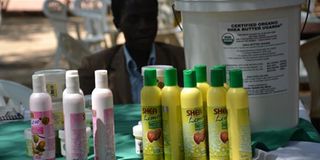Lira agro-processor makes Shs1.5b per year from shea nut

Some of the Shea products. Photo by EDGAR R. BATTE
What you need to know:
Surjit Singh, a Ugandan of Asian origin, started as a small scale seed oil processor in Kampala. But when he shifted to Lira, he discovered the shea nut tree and its treasures. He told Edgar R. Batte his story.
My name is Surjit Singh, Managing Director of Guru Nanak Oil Mills, a company in the northern town of Lira that processes shea nut into high-quality products. We produce certified organic shea butter, pure natural shea butter and pure natural sunflower cooking oil and sesame oil.
Today, I am the biggest exporter of shea butter and related- products. I work with over 2,000 farmers around the country; most of them are in northern Uganda, where conditions favour growth of the shea nut tree. In 2013, we produced about 350 tonnes of shea butter and paid out a total of Shs700m to the farmers and the suppliers that we buy from.
However, there are people who still cut down the tree for charcoal and firewood. This is a daily challenge, I am faced with, of convincing them not to cut these trees for charcoal because they can earn more money by harvesting the nuts and selling it to agro-processors like me.
Investments made on time
The shea nut tree grows wildly though more farmers have begun growing it domestically. When it is mature, it bears fruit once in a year. When we receive or collect the nuts from communities at the factory, we wash them with clean water, dry them under the sunshine and put them in the machine for extraction.
The machine is one of my biggest investments. In addition, the whole plant includes a laboratory and refining processor. It sits on four acres, which cost us Shs75m. About 40 people are employed at the factory and the production capacity is 20 tonnes in a day.
Another reason that drove me to invest heavily in this project was the advantages in shea nut extracts in beauty products, medicinal and nutritional use. To retain most of these benefits, I developed the technology which helps retain all qualities. We have a good market outside Uganda. In a good season, the profits can be up to Shs1.5bn.
These handsome earnings are part of the reason that drove me out of a well-paying job to start on my own company. My initial idea was to extract oil.
I felt I had done my time with being employed. I was working at Mukwano Group of Companies as the chief chemical engineer for 10 years. I helped start Mukwano Industries. I was their production manager and worked there from 1985 to 1996.
When I left, the first business I did was oil milling. Then I went into making different things like liquid soap and candles. To do business, I thought it was wise to acquire citizenship which I got the same year, in 1996. I began with a small business was in Kawempe, making sunflower oil.
Moving to Lira
It was a very small company, which I started with Shs30m. These were the savings from my job. I had been getting about $600 (about Shs1.5m). It was very risky leaving the job but I took the risk anyway. We used to produce about one tonne a day, which we sold locally. Because the source of raw material is in the north, we calculated that it made business sense to be near it. So we decided to shift to Lira.
While there, I saw the shea nut tree, I read about it and decided to start working on it. I was surprised that no one had thought of doing something with the trees, let alone do meaningful development with its fruits.
I felt inspired. Since I have experience on seeds I decided to dedicate resources to the shea nut. This was in 1998. I went into it, started slowly since I invested almost every last penny I had. My first close-to-meaningful return on investment was $1,000 (about Shs2.5m), which was after a while. It was not the ideal return but I was unfazed.
To promote shea nut, I engage in various exhibitions, within Uganda and and in different countries. Slowly, business improved. But we needed to get certified and I did that too. We got certified as organic producers. People began trusting my products. For instance, in November last year, we were in Japan and we are going to Germany soon. People out there like our shea butter and our prices are favourable.
Reaping the benefits
Locally, we sell it at $4 (about Shs10,000) a tin but on the international market, the same tin is at $20 (about Shs50,000). I am working on marketing these products through international exhibitions but still remain on the local market. We need a mass media campaign to increase knowledge about the uses of shea tree.
The challenge is that most communities do not know about shea nut. It is probably those in the areas where it grows, like in Lango and Acholi, who know. Very few people in other parts of the country are aware of its benefits.
My future plan is to expand the factory to include production of oil from other seeds. I estimate the production machinery for this will cost me $300,000 (about Shs750m). When I achieve that I will be on my road to more career and commercial success.
My advice to those who want to go into the business: You need to spot the farmers and raise their awareness. You should do a lot of research, start small and you should be ready to move to northern Uganda because that is where the farmers are located. It is very important to be close to the farmer in order to reduce the transport costs.




